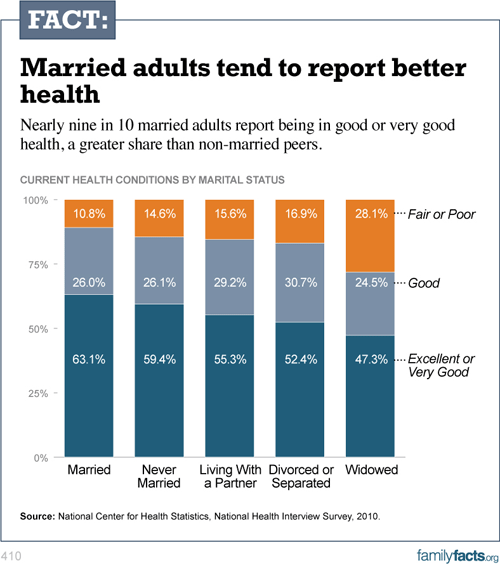For many, the end of the holiday season and the beginning of a new year activates a new (or old) set of resolutions. A healthier lifestyle often tops such lists.
While exercise and a better diet are the most-touted health contributors, marriage, as recent research suggests, can be a significant factor as well.
For example, married individuals tend to report better health. According to the National Health Interview Survey, 89.2 percent of married adults report being in good or very good health, compared to 85.4 percent of never-married adults, 84.4 percent of cohabiting individuals, 83.1 percent of those who are divorced or separated, and 71.9 percent of widows and widowers.
Other health outcomes linked to marriage include higher levels of psychological well-being, reduced alcohol abuse, and better physical health.
A study by the U.S. Department of Health and Human Services, which reviewed the highest-quality research on the subject since 1990, concludes, “In some areas, the evidence of a positive effect of marriage on specific health outcomes is compelling. In particular, there is strong evidence, based on rigorous research methods, that marriage reduces the prevalence of heavy drinking and marijuana use among young adults.”
Moreover, marriage “is also linked to improvements in mental health for both men and women. In addition, marriage increases the likelihood of having health insurance coverage, particularly for women.”
In addition, the study concludes, “Recent research suggests that marriage may be associated with lower health care costs among older adults, through its effect on the number of doctor visits, the length of hospital stays, and the likelihood of admissions.”
Finally, “there is also substantial evidence that growing up with married parents leads to better long-term physical health, particularly for men.”
The health benefits associated with marriage are well established. There is evidence, however, that suggests that married individuals lead a more sedentary lifestyle, and marriage is associated with modest weight gain. The research on marriage and smoking is more mixed.
In sum, the general research findings on the connection between marriage and health are encouraging. For policymakers grappling with health care issues, that’s one more reason to promote the institution of marriage as a guardian of public health.




























